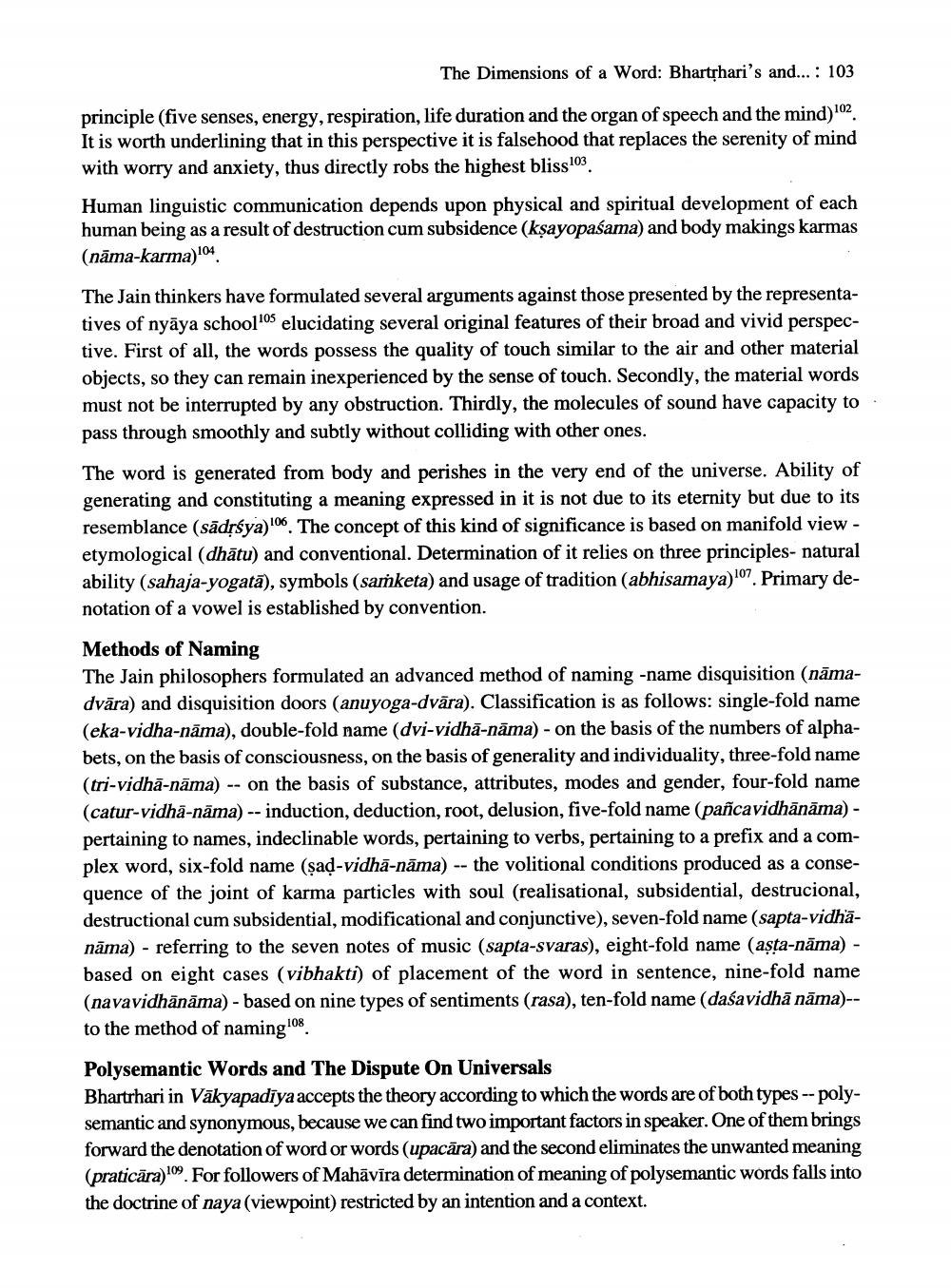________________
The Dimensions of a Word: Bhartěhari's and... : 103
principle (five senses, energy, respiration, life duration and the organ of speech and the mind)102. It is worth underlining that in this perspective it is falsehood that replaces the serenity of mind with worry and anxiety, thus directly robs the highest bliss 103.
Human linguistic communication depends upon physical and spiritual development of each human being as a result of destruction cum subsidence (kşayopaśama) and body makings karmas (nāma-karma)104
The Jain thinkers have formulated several arguments against those presented by the representatives of nyāya school's elucidating several original features of their broad and vivid perspective. First of all, the words possess the quality of touch similar to the air and other material objects, so they can remain inexperienced by the sense of touch. Secondly, the material words must not be interrupted by any obstruction. Thirdly, the molecules of sound have capacity to pass through smoothly and subtly without colliding with other ones.
The word is generated from body and perishes in the very end of the universe. Ability of generating and constituting a meaning expressed in it is not due to its eternity but due to its resemblance (sādrsya)'. The concept of this kind of significance is based on manifold view - etymological (dhātu) and conventional. Determination of it relies on three principles- natural ability (sahaja-yogatā), symbols (sarketa) and usage of tradition (abhisamaya)107. Primary denotation of a vowel is established by convention.
Methods of Naming The Jain philosophers formulated an advanced method of naming -name disquisition (nāmadvāra) and disquisition doors (anuyoga-dvāra). Classification is as follows: single-fold name (eka-vidha-nāma), double-fold name (dvi-vidhā-nāma) - on the basis of the numbers of alphabets, on the basis of consciousness, on the basis of generality and individuality, three-fold name (tri-vidhā-nāma) -- on the basis of substance, attributes, modes and gender, four-fold name (catur-vidha-nama) -- induction, deduction, root, delusion, five-fold name (pañcavidhānāma) - pertaining to names, indeclinable words, pertaining to verbs, pertaining to a prefix and a complex word, six-fold name (şad-vidhā-nāma) -- the volitional conditions produced as a consequence of the joint of karma particles with soul (realisational, subsidential, destrucional, destructional cum subsidential, modificational and conjunctive), seven-fold name (sapta-vidhanāma) - referring to the seven notes of music (sapta-svaras), eight-fold name (aşta-nāma) - based on eight cases (vibhakti) of placement of the word in sentence, nine-fold name (navavidhänāma) - based on nine types of sentiments (rasa), ten-fold name (daśavidhä näma-- to the method of naming!08. Polysemantic Words and The Dispute On Universals Bhartrhari in Vākyapadiya accepts the theory according to which the words are of both types -- polysemantic and synonymous, because we can find two important factors in speaker. One of them brings forward the denotation of word or words (upacāra) and the second eliminates the unwanted meaning (praticāra)09. For followers of Mahāvīra determination of meaning of polysemantic words falls into the doctrine of naya (viewpoint) restricted by an intention and a context.




